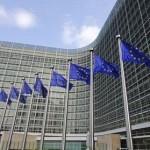Britain will notify formally its intention to leave the EU on March 29, while European leaders are gathering in Rome on March 25 to commemorate the 60th anniversary of the Treaty signed there (on 25 March 1957), whereby a Common Market was established between the six founding members. They will deliberate on what is to become of the European Union.
In the last few months, pro-European demonstrations led by an informal movement, the Pulse of Europe, have been taking place every Sunday in various cities, mostly in Germany. It all started with an unprecedented pro-EU demonstration in September 2016 to protest against Brexit. This is a new and very important development: after two decades of indifference, public opinion is gradually turning towards the European project, not by default, but for positive reasons.
Britain’s departure leaves behind 27 countries, and to give them some food for thought, European Commission President Jean-Claude Juncker has published a white paper[1], outlining the possible scenarios for the future of Europe. The most likely of them is the so-called “multi-speed” Europe, having the support of France and Germany, the two pillars of the European Union since its inception in 1957. It takes into account the near impossibility of having 28–and now 27–countries agreeing unanimously on everything and thus accounts for the paralysis of the institution. This suggestion that a group of countries might decide to go ahead on some issues regardless of the misgivings of others has infuriated some, such as Poland. But it is widely seen as the only solution for a renovated Union to go forward without being held hostage by reluctant member states the way the UK did since it joined the club in 1973.
Predictions of imminent doom for the EU found currency because the last few years have dealt it more than its share of bad news: the Greek financial crisis threatened the very existence of the euro. The high level of unemployment in most of Europe has fuelled the anti-EU sentiments because of the austerity-driven economic policy advocated by Brussels, which, in turn, helped the rise of anti-European political parties across the continent.
The refugee crisis also deepened the divide between Western European countries (mostly Germany), and the European Commission, which felt it was the EU’s duty to welcome its share of Syrians fleeing the civil war raging at home, on one side. The Eastern European countries (Slovakia, Hungary, Poland, the Czech Republic), on the other hand, strongly opposed such an attitude, seeing it as a threat to the continent’s Christian identity. Meanwhile, the new American president Donald Trump said in an interview[2] that he approved of the EU’s dismantling while his appointee as the future U.S. ambassador to the EU, Ted Malloch, suggested that in his new post, he would gladly help effect the task.
The EU’s survival looks likely now since the Greek debt crisis, although not yet over, is no longer perceived as a threat to the euro. Even German politicians, such as the finance minister, Wolfgang Schäuble, now denies they want to push Greece out. Most of the Eurozone has once again found the path to economic growth, albeit a moderate one. The European economy has resumed creating jobs, and the unemployment rate, although still high, is steadily decreasing. The euro area seasonally adjusted unemployment rate was 9.6 % in January 2017, stable compared to December 2016, and down from 10.4 % in January 2016[3].
But these good tidings apart, European citizens and leaders alike have had a glimpse of what the alternative might be, and it has frightened them. Brexit was a strong warning, and despite the fact that the British economy is still doing better than anticipated, the apparent absence of strategy displayed by the British government did not bode well for the future. This led many European leaders, once well disposed towards the UK, such as Denmark, the Netherlands, and even Germany, to harden their position and eventually align themselves with “hardliners” such as France, Spain, Italy or the European Commission.
In Austria, in the presidential election last December, voters spurned the far right Europhobe candidate, Norbert Hofer, and instead chose environmentalist Alexander Van der Bellen, who strongly campaigned on behalf of Europe. In the Netherlands, this March, voters dashed the hopes of the charismatic anti-EU far right candidate Geert Wilders. In Germany, the anti-Europe Alternative for Germany (AfD) party, which emerged during the refugee crisis, plummeted in the polls, and whatever the outcome, (Angela Merkel’s Christian Democratic Union or Martin Schulz’s Social Democratic Party), the future government will be led by staunchly pro-European leaders. In France, opinion polls show a strong majority that is refusing to leave the EU despite rising support of the anti-European Front National.
Yet, such survival comes at a cost: it’s clear that unity is no longer a paramount objective within the European Union.
Olivier Da Lage is editor-in-chief at Radio France International. He contributes to Gateway House in his personal capacity.
This article was exclusively written for Gateway House: Indian Council on Global Relations. You can read more exclusive content here.
For interview requests with the author, or for permission to republish, please contact outreach@gatewayhouse.in.
© Copyright 2017 Gateway House: Indian Council on Global Relations. All rights reserved. Any unauthorized copying or reproduction is strictly prohibited
References
[1] Gove, Michael, ‘Donal Trump: I’ll do a deal with Britain’, The Times, 15 January 2017, <http://www.thetimes.co.uk/article/donald-trump-interview-brexit-uk-trade-deal-theresa-may-phthbjsmw>
[2] European Commission, European Union, Commission presents White Paper on the future of Europe: Avenues for unity for the EU at 27, 1 March 2017, <http://europa.eu/rapid/press-release_IP-17-385_en.htm>
[3] Eurostat statistics Explained, European Union, Recent developments in unemployment at a European and Member State level, 3 April 2017, < http://ec.europa.eu/eurostat/statistics-explained/index.php/Unemployment_statistics#Recent_developments_in_unemployment_at_a_European_and_Member_State_level >


